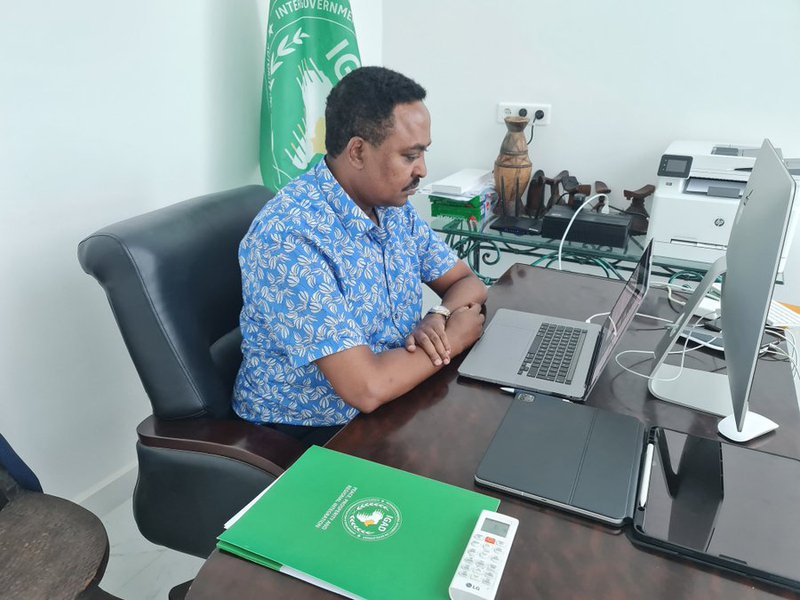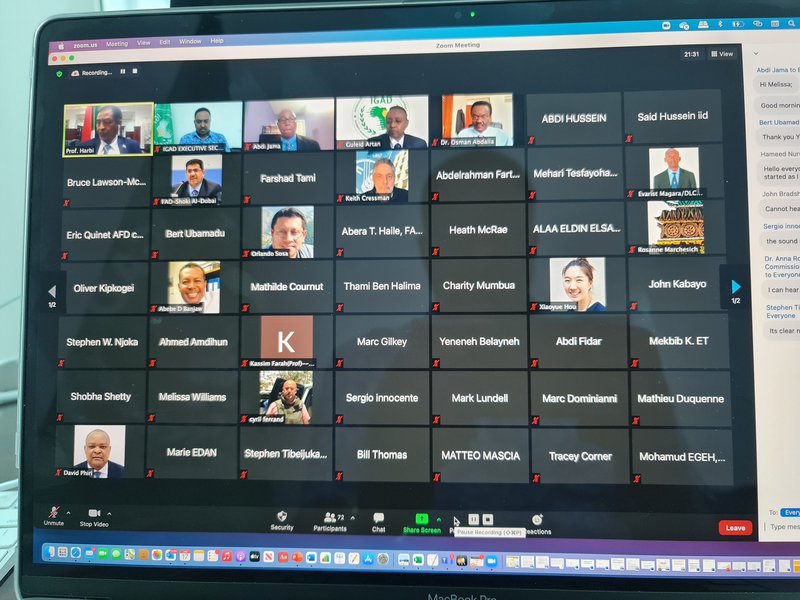IGAD to Establish an Inter-regional Coordination Platform for the Management of Desert Locust and other Transboundary Pests

On the 17th of June 2021, IGAD held a Ministerial Conference on the Sustainable Management of Desert Locust and other Transboundary Pests. The meeting brought together Ministers of Agriculture from IGAD Member States as well as neighboring countries, such as Yemen, with the objective to reach a consensus on the required set of actions needed to control transboundary pests which are expected to increase under a changing climate. The Ministerial Conference was the culmination of a series of studies conducted by the World Bank, the Food and Agriculture Organization of the United Nations, the French Development Agency as well as recommendations from IGAD technical and Ministerial meetings on Desert Locust since 2020. The endorsement by the Ministers of Agriculture of the region, of a route map to control transboundary pests, sets the basis for a more sustainable and efficient management of Desert Locust and other transboundary pests.
Eastern Africa has been battling the worst Desert Locust invasion in the last 70 years [1], as a result of the Indian Ocean’s warming and the increasing number of cyclones affecting the region. Outbreaks, like the current desert locust invasion, are expected to increase in the future, pointing to the need for increased investment in monitoring, control and early action. These require strong transnational early warning systems and control measures.
Countries in the region are still working to contain the desert locust outbreak, especially Ethiopia and Somalia. Pest outbreaks are one of the compounding shocks currently exacerbating food insecurity in the region, in addition to conflict, macro-economic challenges, the socio-economic impacts of COVID-19, and the increasing frequency and intensity of climate extremes. H.E. Dr Workneh Gebeyehu, the IGAD Executive Secretary highlighted that “Our region remains one of the most vulnerable to food insecurity in the world. According to the Food Security and Nutrition Working Group statement for April 2021, there are over 32 million people faced by Crisis or worse food insecurity status (IPC/CH Phase 3 or higher) in the IGAD region.” In support of the inter-regional platform Dr Shobha Shetty, Manager in Agriculture and Food, Africa East/South of the World Bank stated “I am happy to announce that the World Bank has also just approved a $3 million grant to IGAD to start the inter-regional platform to facilitate exchanges among countries, regional organizations, and international organizations in the Horn of Africa.”
Here are the key points of the Joint Agenda for action that was endorsed by the Ministers:
- Establish an inter-regional platform to facilitate exchanges between frontline countries in the Horn of Africa and the Arabian Peninsula, and invasion countries. The platform will aim to enhance institutional arrangements and create a joint/coordinated strategy for frontline and invasion countries, coordinate response, training plans, sharing of information, and conducting south-south exchange programs to promote experience sharing and learning.
- Enhance the provision of timely and actionable Early Warning information to all actors by strengthening the IGAD Climate Prediction and Applications Centre (ICPAC).
- Develop Inter-regional Pests Early Warning System, national and regional risk assessment and crisis management plans, as well as, national and regional preparedness plans encompassing the required institutional and human capacity, infrastructure/technology, training programs, research, and information required for a sustainable national system.
- Develop research agenda on the use of bio-pesticides, utilization of desert locusts for food/feed, the gene isolation for the identification of pheromone producing chemicals.
- Establish public-private partnership (PPP) agreements at national and regional level to maintain and strengthen the availability of supplies and services needed to respond to desert locusts and other pest outbreaks, while learning from the current upsurge about the role of the private sector as a key partner in the fight against pests.
Note
[1] This figure varies per country
Resource

